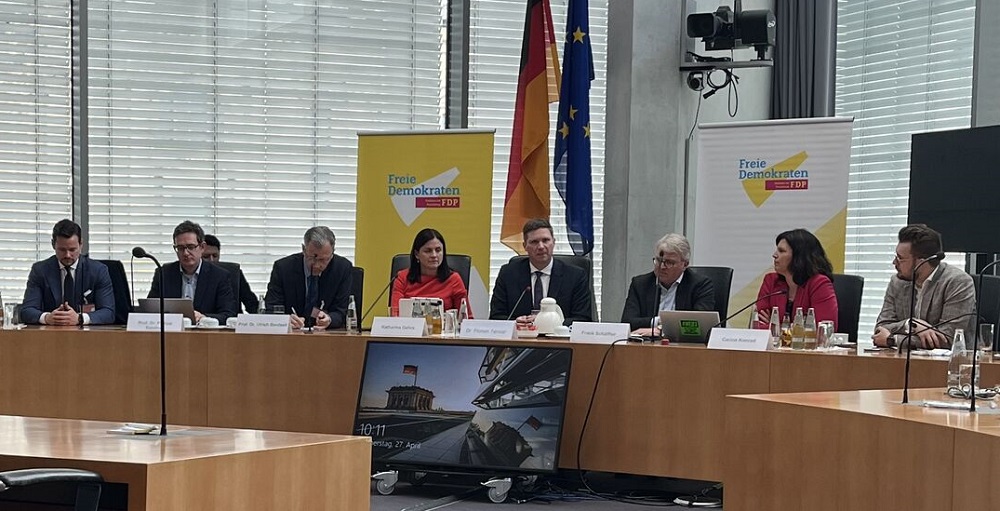
The discussion showed that there is a strong interest in wholesale CBDC. According to ECB, there will soon be an announcement regarding wholesale CBDC.
The third roundtable about challenges and risks of the potential euro CBDC by the European Central Bank was once again hosted by the German Liberal Party at the Deutscher Bundestag/Bundesrepublik Deutschland. After the opening keynote by Dr. Florian Toncar, Parliamentary State Secretary in the Federal Ministry of Finance, a lively discussion amongst the panelists Ulrich Bindseil, Philipp Sandner, Frank Schäffler and those invited started, bringing forth the following key takeaways:
Blockchain-based?
The retail euro CBDC will most likely not be blockchain-based, Ulrich Bindseil expressed that the intended use cases do not ask for blockchain as an infrastructure and would actually add certain inefficiencies (e.g., during recovery of payment data). Ulrich fittingly said that some want the ECB to continue only issuing money in the format from ages ago and some want the ECB to use technology of the 21st century that has not yet been tried and tested on a large scale.
wCBDC?
According to Ulrich Bindseil, the focus is currently not on wCBDC because the private sector has built an efficient payments infrastructure (SEPA) that is working well which causes fewer policy problems and as a result, lowers the need for fast action. However, news regarding a wCBDC is to be announced soon. The topic of wCBDC was framed by the present guests as a topic that receives significantly too little attention, given the relatively higher transaction volume that wholesale payments handle as compared to rCBDCs. wCBDC was described as the better fit for a blockchain infrastructure (single ledger) rather than a rCBDC.
Privacy?
The degree of privacy is not determined by the ECB, but by the European regulator. Having cash-like privacy is only technically possible for rCBDCs but is an aspiration almost delusionally far from the reality that AML, CTF and pattern detection in fraudulent activities that a rCBDC must absolutely comply with.
Open-source money API?
The aspiration of a euro CBDC to be open-source and programmable equals conflicting visions for a euro CBDC between industry, the ECB and of course – the crypto world. The ECB is no risk-hungry start-up looking to move fast and break things. As Philipp Sandner said, we are talking about the idea of a euro debit card, nothing more.
Set in stone design?
Regardless of the initial configuration of a euro CBDC (e.g., remuneration model, holding limits etc.), a euro CBDC will technically always be amenable in the future and design characteristics cannot be guaranteed as external forces and monetary policy objectives.
Other reactions
Florian Toncar – the State Secretary at the Federal Ministry of Finance (BMF)
During the event, Florian Toncar highlighted that the digital euro is a top priority for the BMF. However, the goals and focus of the digital euro remain unclear to him. Mr. Toncar emphasized that, if the goal is to provide a digital alternative for cash, the digital euro should also have the privacy features of cash. He stressed that privacy should be a core focus – even if it is technically challenging to ensure holding limits and provide strong privacy guarantees.
There were also discussions regarding on which design questions the European regulator should decide and on which the European Central Bank. According to Mr. Toncar, this should be an individual case-by-case decision. For instance, the decision on whether to include interest rates should be a political decision.
Ulrich Bindseil, from the ECB
He expressed that the ECB is a „fan of cash” and that the focus is on the coexistence of bank money and central bank money. Regarding the political process, he clearly stated that the decision on the degree of privacy should not be taken by the ECB, but by the European regulator. He also stated that the principles of open banking should be preserved for the digital euro and payments should be triggered through APIs.
Bindseil addressed the question of why an end customer would use a digital euro by mentioned several reasons such as convenience, ease of use, and low fees for merchants. „For me, these reasons are by far not strong enough.” – says Dr. Jonas Gross, Chairman of the Digital Euro Association.
Banking 4.0 – „how was the experience for you”
„To be honest I think that Sinaia, your conference, is much better then Davos.”
Many more interesting quotes in the video below: